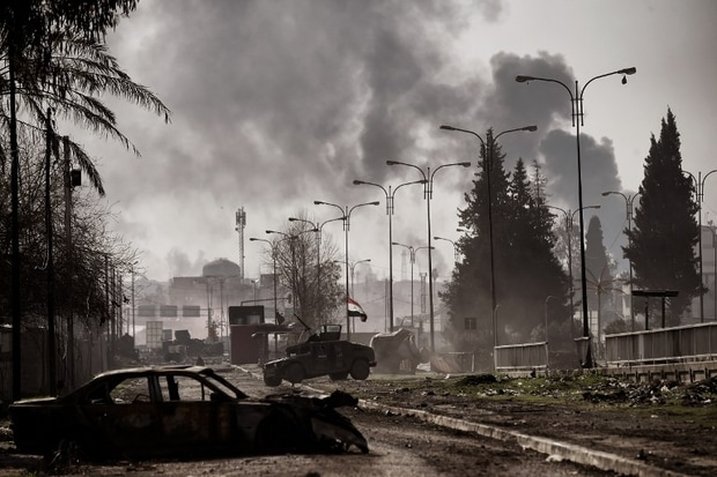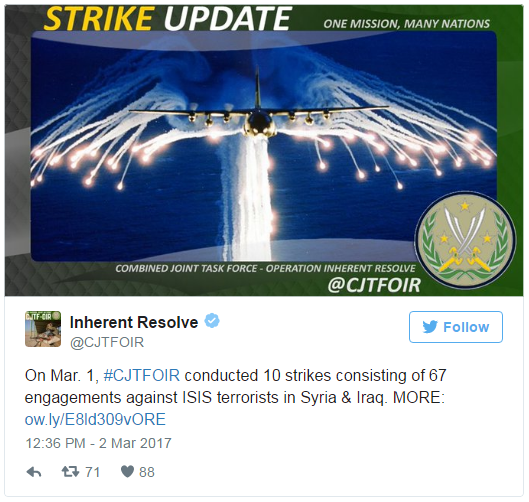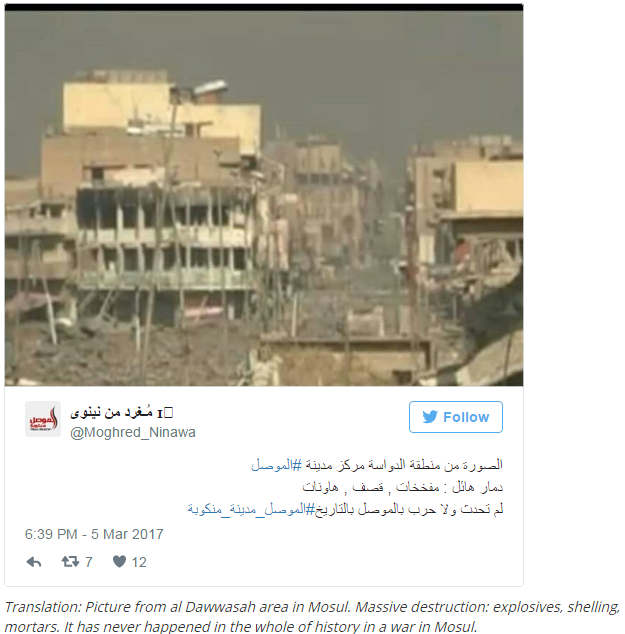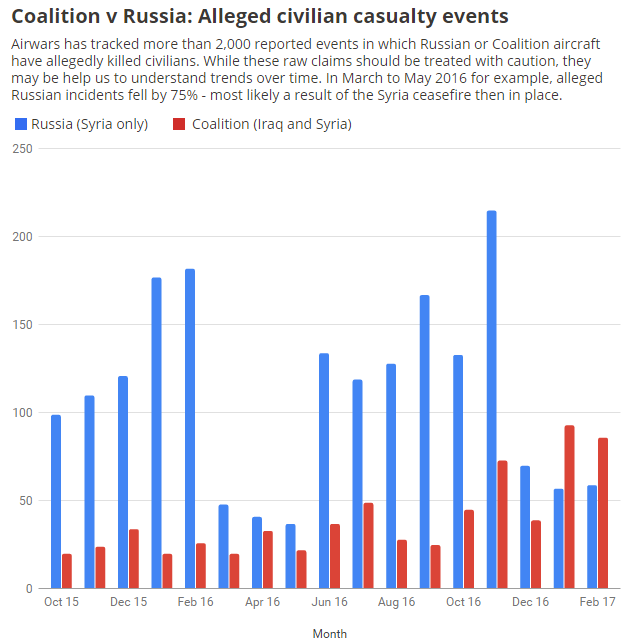The US-led coalition fighting the Islamic State may have killed hundreds of civilians in the first week of March in support of Iraqi forces storming western Mosul, according to reports by monitoring group Airwars.
Using open-source data and witness reports, the group estimated that between 250 and 370 civilians had been killed in 11 incidents in the heavily populated western side of the city since 1 March. Out of the 11 incidents, four were backed by two or more sources saying the coalition was responsible for the strikes, it said.
Airwars is an independent monitor that uses all available sources, cross-referencing them with the coalition's own official lists of air strikes.
Iraqi forces captured the eastern side of Mosul in January after 100 days of fighting and launched their attack on the districts that lie west of the Tigris river on 19 February.
The UN estimated that around 750,000 people were still in the western sector of Mosul when the battle started. About 40,000 civilians have been forced from their homes in the past week, according to the International Organisation for Migration.
Airwars listed the strikes it said had caused civilians casualties in the push into the west of the city. In one of the deadliest, it estimated between 50 and 80 people were killed in a 1 March attack on a mosque used for shelter by refugee families.
As many as 130 civilians were killed during an assault on a government compound in the Dawassa district, with several local sources reporting the involvement of US Apache helicopters. Both coalition and Iraqi forces, however, were cited by different outlets as being responsible.
Images reportedly taken after the attack show the level of destruction in the district.
The chain of responsibility was less clear for several of the other incidents, but the tally of casualties was not.
A day later, on 6 March, between 25 and 33 imprisoned Iraqi policemen have allegedly been killed by coalition strikes on a building used by IS as a prison. Several IS militants were also killed.
Deadliest week in battle for Mosul
Airwars said the week-long period had been the deadliest for civilians since the launch of hostilities. Between 254 and 369 civilians were assessed as likely having been killed by US coalition bombs in January, and between 134 and 187 in December.
The United States Central Command, which has responsibility for military operations in the Middle East, said it took all allegations of possible civilian casualties seriously.
"The coalition will fully assess this allegation to assess its validity," a spokesman said. "The collation releases a monthly report on all civilian casualty allegations and assessments to be as transparent and forthcoming as possible.
"Coalition forces comply with the Law of Armed Conflict and take all feasible precautions during the planning and execution of airstrikes to reduce the risk of harm to civilians."
The US military said on Saturday that a total of 21 civilians were killed between November and January across all Middle East theatres. It maintains that a total of 220 civilians have been unintentionally killed in air strikes against IS in Syria and Iraq since 2014.
The figure is much lower than the 2,463 total civilian casualties reported by Airwars. The monitoring group said that they work closely with Centcom to investigate any civilian casualty, but the discrepancy is number is due to the inaccurate monitoring system used by the Coalition.
"This is an air war fought from the skies with proxies on the ground," Airwars said. "The US are not downplaying the number of casualties, but they don't have the monitoring on the ground to assess properly the presence of civilians and the number of casualties."
The monitoring group is working closely with the countries involved in the airstrikes in the hope of reducing the death toll and improve transparency.
The British ministry of defence said Royal Air Force planes were involved in the bombing campaign over Mosul. It could not confirm Airwars figures.
"We have no evidence of civilian casualties resulting from air strikes conducted by the Royal Air Force," said a spokesman.
The MoD has regular contact with Airwars and tries to cross-reference information with the group.
Airwars told Middle East Eye that the UK was one of the most transparent members of the coalition and welcomes its cooperation.
The monitoring group has flagged over 100 incidents involving the RAF, asking them to investigate them.
"Official data released by the White House showed that at least one civilian was killed on average for every seven airstrikes in Afghanistan," Airwars told MEE.
Even if it was one out of 10, the odds of zero casualties on over 100 flagged British air strikes are extremely low according to Airwars.
"We appreciate UK transparency, but it is a dangerous claim to say that there are no civilian casualties in a war. There is no such thing as perfection on the battlefield."
US killing more than Russia in Syria
Airwars' report comes weeks after it stated the US-led coalition was killing more civilians than Russia in its campaign in Syria, reporting that coalition attacks killed an estimated 254 non-combatants in January, whereas according to the Syrian Network for Human Rights, 48 non-combatants were reported killed in Russian attacks.
Airwars said it identified 95 separate "civilian casualty events" in January across Iraq and Syria which allegedly involved US coalition air attacks. In the same period, there were 57 alleged Russian attacks in Syria.
Those figures contrasted to the much higher casualties from Russian strikes (713) - 14 times higher - than US coalition strikes in January 2016.
The monitor said that the shift was in part due to the end of the siege in Aleppo, where Russian air attacks are believed to have killed thousands of people in months of bombing up to and including December, as Syrian government forces and their allies battled rebels in the city.
The US, conversely, has stepped up bombing in Syria - targeting the IS stronghold of Raqqa with 21 attacks in one 24-hour period in February, and also bombing members of Jabhat Fateh al-Sham, formerly known as the Nusra Front, in western Syria.





 RSS Feed
RSS Feed